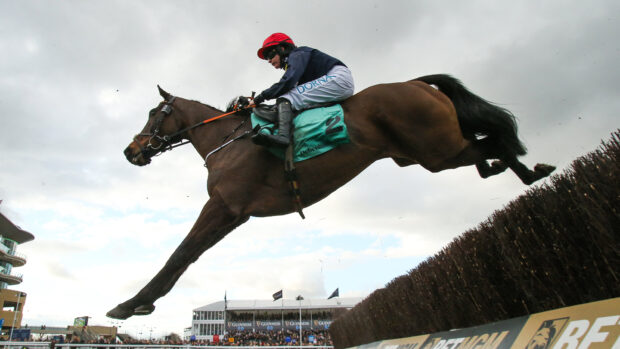Trainer Gordon Elliott was fined £1,000 in a “mystery” contamination case involving the horse who finished third in the 2022 Unibet Champion Hurdle at the Cheltenham Festival.
Zanahiyr, who crossed the line four and a half lengths behind winner Honeysuckle, tested positive for 3-hydroxylidocaine – a metabolite of lidocaine – in a post-race urine sample at last year’s Festival. Mr Elliott opted to have the B-sample tested, which confirmed the finding.
Lidocaine is a prescription-only veterinary medicine, predominately used as a local anaesthetic. It is also available in over the counter products without a prescription for humans. Its use is not banned by the British Horseracing Authority (BHA), but it cannot be present in a horse’s system on raceday and has a 72-hour detection time.
The case was heard this afternoon (8 February) by the BHA’s independent disciplinary panel, made up of chairman David Fish KC, Lyn Griffiths and Ian Stark.
Mr Elliott accepted the breach and the disqualification, which meant the hearing hinged on culpability in deciding what penalty he should receive. But how the substance came to be in the horse’s system remains a mystery. The BHA claimed that the lack of training for Mr Elliott’s staff on how to prevent contamination meant that he could not be considered to have “low culpability”.
But Rory Mac Neice, representing Mr Elliott, disagreed. He argued that the BHA’s thorough investigation found no trace of lidocaine at Mr Elliott’s yard, and that the drug was not present in any medication taken by the 27 staff involved with the horses at the Festival. He added that the “BHA’s own investigation” found nothing to suggest the cause was linked to anything at Mr Elliott’s yard or his staff at Cheltenham. With that in mind, he argued that as the horse was most likely to have come into contact with lidocaine at Cheltenham stables, that the people the horse may have come into contact with there were outside of Mr Elliott’s control.
Charlotte Davison, who presented the BHA’s case, told the hearing that Mr Elliott “co-operated fully” with the investigation and promptly admitted the breach.
The hearing was told how as part of the BHA’s investigation, officials from the Irish Horseracing Regulatory Board made an unannounced visit to Mr Elliott’s yard. No traces of lidocaine were found in any of the medicines, records of past treatment, feed or supplements.
Mr Elliott also provided medication records of the 27 people involved in travelling with and caring for his horses at the Cheltenham Festival, and none of these substances contained lidocaine.
“This is what has been termed in the past a ‘mystery case’,” said Miss Davison.
She added that although Mr Elliott submits that he falls within the low culpability range, the BHA disagrees.
“Mr Elliott, the BHA submits, has failed to ensure that any real, let alone sufficient precautions, were in place on his yard – by that we obviously include travelling procedures when racing away – to prevent potential contamination from staff taking medication,” she said.
“During his interview, Mr Elliott described security at Cheltenham as ‘second to none’. And in any event, the rules of racing make it clear that it is Mr Elliott, and Mr Elliott alone, who is responsible for the security of his horses.
“The BHA submits that Mr Elliott has no proper procedures in place to prevent cross-contamination taking place by members of staff taking medication.”
Part of an interview with Mr Elliott was read out, where he was asked about any staff training around preventing cross-contamination. He said staff were regularly spoken to about not urinating in stables “and that sort of stuff”, and added he’ll “have to be tightening up on it”.
Miss Davison added that although this is Mr Elliott’s first breach of anti-doping rules in Britain, he has had a previous case, in Ireland in 2018, in dissimilar circumstances, so she said this case cannot be considered a first offence.
Mr Mac Neice disagreed, pointing out that British rules make no reference to other jurisdictions.
“It is clear from the investigating officer’s report that Mr Elliott and his staff have fully and wholeheartedly cooperated with the BHA,” he said, adding that they were “as anxious to find the cause” as the BHA.
“What emerges from the BHA’s comprehensive investigation is this: the BHA concluded in its own words that there was ‘little to no risk’ of contamination from the feed, supplements or additives stored or used at Mr Elliott’s yard, nor from any medication kept at the yard. In other words, the BHA’s investigation has to all intents and purposes discounted the possibility of any cross-contamination from those sources.”
The hearing heard the horse travelled from Mr Elliott’s yard in Ireland to Cheltenham on 12 March and was stabled there until returning home on 15 March.
“There is a significant difference in terms of the horse’s security while in his stable at home at Mr Elliott’s yard and while stabled in any racecourse stables – that isn’t a criticism, it’s a fact,” said Mr Mac Neice.
“When at home, the horse is under the complete control of Mr Elliott in terms of who can come into contact with him. If you or I were to wander into Mr Elliott’s yard in Ireland one afternoon, we would be stopped, asked what we were doing and asked to leave.”
He added that Mr Elliott has no control who enters the racecourse stabling area, adding that this is the “unavoidable nature” of racecourse stabling and during the Festival, it is busy.
“Other horses and humans from unconnected yards and places could entirely innocently come into contact with, or be in very close proximity to, the horse,” he said.
“We say that is the overwhelmingly most likely cause of the adverse finding. Entirely unintentional, accidental, cross-contamination during the period the horse was stabled at the racecourse stables during last year’s Cheltenham Festival.”
Addressing the BHA’s submission that Mr Elliott did not have procedures to prevent contamination in place, Mr Mac Neice pointed out that there is no requirement to do so, and that the BHA also does not require anyone entering racecourse stables to provide lists of medication.
Summing up, Mr Fish said the panel was of the position that Mr Elliott’s culpability “falls into the low category”.
“Balancing the mitigating and aggravating features, the panel takes the view that a fine of £1,000 is appropriate,” he said.
Zanahiyr was disqualified, with prize money returned, and the placings will be amended.
You might also be interested in:

Subscribe to Horse & Hound magazine today – and enjoy unlimited website access all year round
Horse & Hound magazine, out every Thursday, is packed with all the latest news and reports, as well as interviews, specials, nostalgia, vet and training advice. Find how you can enjoy the magazine delivered to your door every week, plus options to upgrade your subscription to access our online service that brings you breaking news and reports as well as other benefits.




